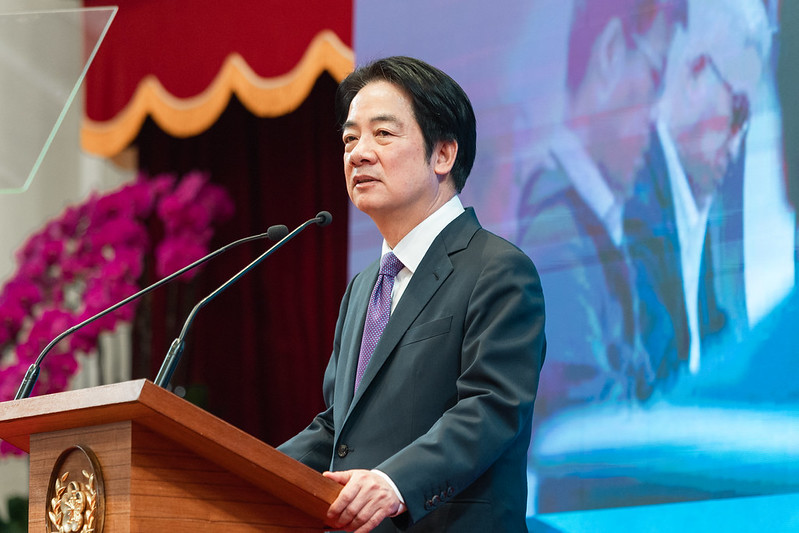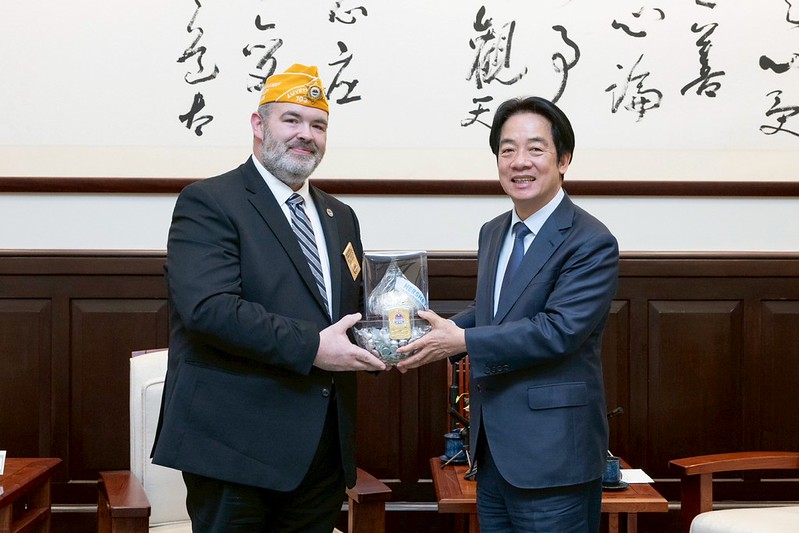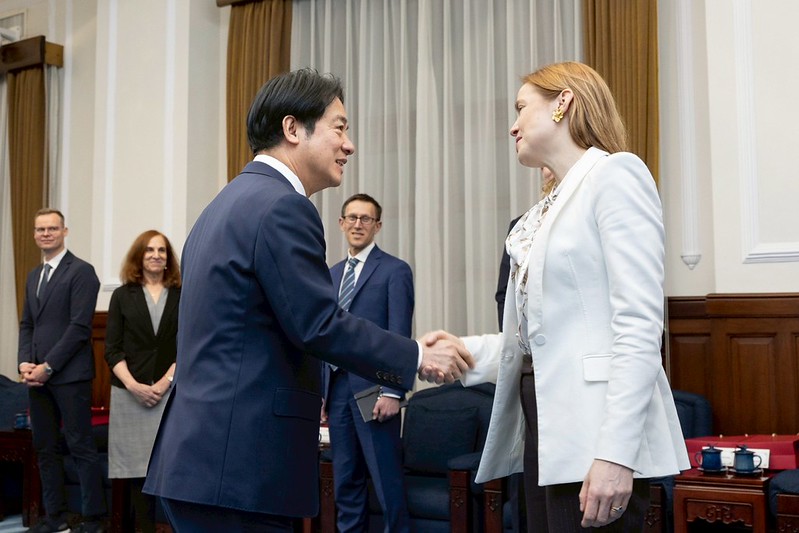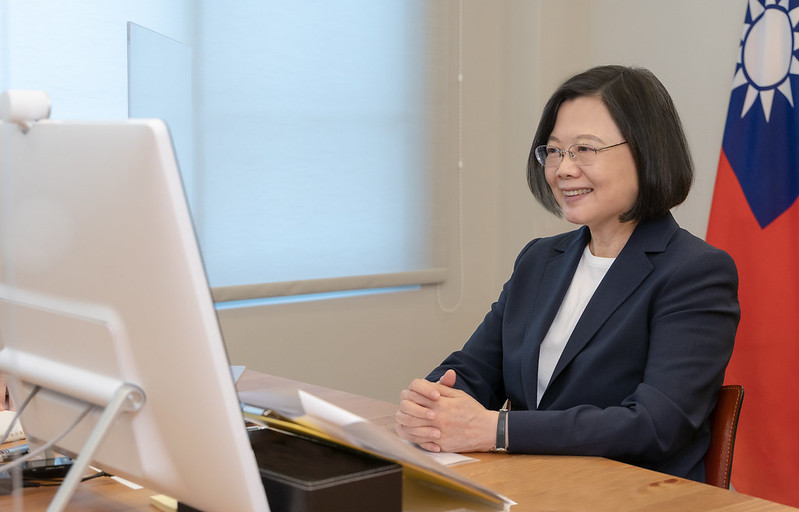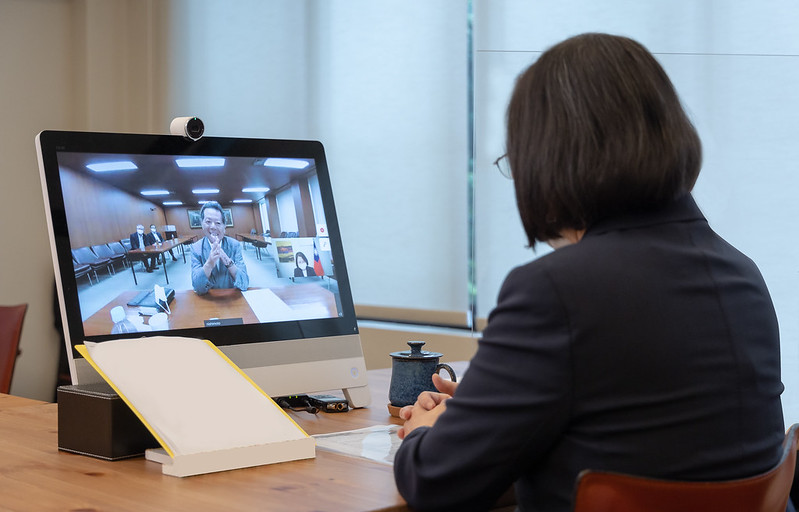News & activities
 News releases
News releases
President Tsai Ing-wen was recently interviewed via videoconference by the Japanese monthly magazine Bungei Shunju, during which she responded to questions from Dr. Yoichi Funabashi about Taiwan's COVID-19 response, Taiwan-US-Japan relations, cross-strait relations, the situation in Hong Kong, the development of Taiwan's semiconductor industry, Taiwan's international participation, and regional security and economics.
A translation of the interview follows:
Dr. Funabashi: Since last year, the spread of COVID-19 has caused chaos internationally. In East Asia, we have also seen attempts to use power to change the status quo, increasing geopolitical risk. Taiwan's position in all of this has attracted broad international attention. The direction Taiwan takes is also a matter of concern for Japan. I am honored to have this opportunity to conduct this virtual interview with you today, President Tsai.
President Tsai: It is an honor for me as well. As president of Taiwan, I would first like to congratulate the government and citizens of Japan. Last March, it was decided that the Tokyo Olympics and Paralympics were to be postponed by a year due to the spread of the global pandemic. Many other complications followed, but Japan overcame these obstacles to hold the Olympics beginning in July. As Japan's island neighbor, I would like to express Taiwan's sincere congratulations.
The Japanese government needed great determination and courage to hold the Olympics before the pandemic subsided. And I am sure that seeing athletes competing and testing their limits was a source of encouragement for many suffering from the pandemic.
Dr. Funabashi: I would first like to ask about Taiwan's COVID-19 response. In the early days of the pandemic, Taiwan successfully kept the virus at bay, becoming a model of disease prevention.
President Tsai: Having taken lessons from the SARS epidemic in 2003, we set up our Ministry of Health and Welfare's Centers for Disease Control (Taiwan CDC), which was modeled after the Centers for Disease Control and Prevention in the United States. Before the pandemic reached Taiwan, Taiwan CDC had already begun to implement preventive measures under expert guidance. Our experience helped us effectively respond to the spread of COVID-19.
Dr. Funabashi: But in May this year, a highly infectious variant appeared and local transmission increased. Vaccine supply was unstable, Taiwan had the lowest vaccination rate among advanced countries, and it seemed like government authorities faced severe criticism.
President Tsai: Taiwan raised the nationwide epidemic alert to Level 3 on May 19, limiting gatherings, closing entertainment venues, and restricting people's movements. And due to a global shortage, the vaccines we had purchased couldn't be delivered as scheduled. That had a major effect on many citizens, and caused widespread unease.
But thanks to the unremitting efforts of our government and people, by the beginning of July the situation here was relatively stable. The lower number of new domestic infections showed that the outbreak was under control. On July 27, the epidemic alert was lowered from Level 3 to Level 2, and the public felt more reassured. But there's no room for complacency, and we will continue this work so that we can gradually return to our pre-pandemic lives.
Dr. Funabashi: Addressing Taiwan's vaccine supply at a press conference on May 26, you stated that "China intervened" in Taiwan's contract to purchase COVID-19 vaccines from Germany's BioNTech. Is China still "intervening"?
President Tsai: At that time, we did indeed face great difficulty in purchasing vaccines. That brought international attention to Taiwan, and countries including Japan and the US helped out by providing vaccines. I want to take this opportunity to express our sincere thanks.
When the first batch of vaccines from Japan arrived at Taiwan's Taoyuan International Airport on June 4, local TV channels broadcast live from the scene, and many in Taiwan welcomed the shipment. I clearly recall the plane's arrival. This was a testament to the long-standing friendship between our countries. Japan extended a helping hand when Taiwan needed it most, for which the people of Taiwan are extremely grateful.
Taiwan's government also formally authorized private enterprises and groups to negotiate vaccine purchases. As a result, the major Taiwanese corporations Taiwan Semiconductor Manufacturing Company (TSMC) and Hon Hai Technology Group (Foxconn), as well as the charity Tzu Chi Foundation, successfully purchased vaccines through public-private sector cooperation.
Clinical trials for our domestically produced vaccines have also shown promising results, and we hope to start administering them as soon as possible. Compared to the initial stage of our vaccine acquisition efforts, supply has now stabilized. But to satisfy future public demand, we are continuing all-out efforts on this front.
Dr. Funabashi: New daily infections in Taiwan are now in the single or double digits, which is low compared with Europe or the US. In the development of Taiwan's domestically produced vaccines, was it difficult to conduct large-scale clinical trials requiring tens of thousands of participants?
President Tsai: Because there were several times more participants in our expanded Phase 2 clinical trials than is usual for this phase, we were able to gather more data. We also adopted the immunobridging approach used in clinical trials overseas. This approach can shorten the time needed to approve a new vaccine. We understand that Japan has recently adopted a similar method.
Dr. Funabashi: During the pandemic, there have been reports that China has been attempting to divide Taiwanese society by frequently spreading false information online, such as fake news claiming that the vaccines donated by Japan caused a sharp spike in the number of deaths. What do you think is the best approach for responding to politically motivated activity like disinformation? This is not just an issue for Taiwan, but a concern shared by Japan and other countries.
President Tsai: We view public communication as a critically important part of our response to infectious diseases. For example, since our Central Epidemic Command Center (CECC) was activated back in January 2020, it has held press conferences every day, without exception, to explain our government's pandemic response strategies. These daily press conferences also allow the media to ask questions. This lets everyone see the question-and-answer process and is an extremely transparent way of providing information. These press conferences have had some success in preventing the spread of fake news. We also provide disease-prevention information to the public every day on official LINE accounts, through public service TV broadcasts, and on social media including Twitter and Facebook.
Because of these measures, the CECC has gained a high level of trust from the public, who are willing to follow the isolation and testing measures called for by the CECC as well as its guidelines for priority vaccination candidates. It helps when the government and public work together to fight the pandemic.
Dr. Funabashi: Next, I would like to turn to international affairs. The joint statement issued by the leaders of Japan and the US following their summit meeting in April included language underscoring the "importance of peace and stability across the Taiwan Strait." That was the first time that the leaders of Japan and the US had mentioned Taiwan at a summit since President Richard Nixon and Prime Minister Eisaku Sato met in 1969, half a century ago. What did you think about the joint statement?
President Tsai: We followed the Japan-US summit closely. I want to thank both countries for showing the importance they place on peace and stability across the Taiwan Strait.
The importance of peace and stability across the Taiwan Strait was also mentioned at the G7 Summit hosted by the UK in June. This shows that the world's major advanced countries see this peace and stability as critically important, and is ample proof that Taiwan is not the one undermining the status quo across the Taiwan Strait.
Peace and stability across the Taiwan Strait is not just about Taiwan's interests. We believe that Taiwan can play a key role for all countries in the Free and Open Indo-Pacific. We will continue to engage in communication and exchanges with like-minded countries in order to contribute to the peace and prosperity of countries in the Indo-Pacific region.
Dr. Funabashi: Some think that the joint statements issued following the Japan-US summit and the G7 Summit mentioned the Taiwan Strait because the US and its allies are very concerned about their decreasing ability to deter China. Do you also think that the ability of the US to deter China has declined?
President Tsai: Over the past few years, China has made clear its far-reaching ambitions in the Asia-Pacific region. That has introduced a great deal of uncertainty into the region's overall prospects for peace, stability, and security. Under these circumstances, when Japan, the US, and other countries discuss and express their concern about the Taiwan Strait, they are actually sending a message to China as it continues to expand its military activities.
When implementing policy decisions, China should have to consider trends in the international community. I believe that the more attention major advanced countries pay to Taiwan, and the stronger our cooperation with them, the more careful China will have to be in its policy decisions, including those about military activities.
Dr. Funabashi: Compared to China, Taiwan's national defense budget has not increased significantly, and observers have pointed out that the gap between Taiwan and China's military power has widened considerably.
President Tsai: Because our national defense budget is indeed limited, our approach is to concentrate resources on upgrading our asymmetric warfare capabilities and enhancing our self-sufficiency in defense. This includes indigenously-developed precision and highly mobile weapons.
Cooperation and dialogue with neighboring countries is also essential. We hope to soon form a security dialogue mechanism for the East Asia region, because Taiwan is willing to assume its responsibility for safeguarding regional peace.
Taiwan's consistent position is that we will neither bow to pressure nor act rashly when we have support. Regional peace and prosperity are key considerations when we formulate security strategies, and we are willing to work to upgrade our self-defense capabilities.
Dr. Funabashi: In addition to rapidly expanding its military power and weaponizing its economy, China has also broadened its "wolf warrior diplomacy" offensive. Although Japan and the US want to stabilize their economic ties with China, they have also realized that there is a need for systems that can fully ensure their economic security. They have also been compelled to strengthen their ability to deter China in terms of diplomacy and security. Difficult challenges are inevitable in managing ties with China, and I believe this is the case for Taiwan as well. Which aspect of this are you especially concerned about?
President Tsai: National leaders throughout the Asia-Pacific region are all facing the challenges you pointed out. We need to maintain a certain level of economic relations with China, but we feel uneasy about security issues. This is an extremely difficult issue, which poses a greater challenge to Taiwan than perhaps any other country.
In dealing with China, the Taiwan government's position is to maintain the status quo, which is a "no provocation" policy. One important point here is to break away from our current reliance on China-produced goods, components, and software, and to develop more diversified trade and investment.
Dr. Funabashi: The US would like to decouple its supply chains from China's economy.
President Tsai: Our position is that we should not be over-reliant on China as a production base or market. While taking various risks into consideration, we are seeking to diversify trade and investment. Although many Taiwanese enterprises currently have production bases in China, we need to diversify our trade partnerships and investment destinations going forward. Of course, in addition to Japan and the US, we also hope to establish trade and investment relationships with ASEAN and countries including Australia, New Zealand, and India. This is an unprecedented challenge, but it should bring significant economic opportunities for Taiwan.
Dr. Funabashi: I would also like to ask about your economic growth strategy. What factors have contributed to the stunning growth of Taiwan's high-tech sector in recent years?
President Tsai: Prior to 2016, Taiwan's economic growth had stagnated. In May of that year, when I became president, I proposed the 5+2 innovative industries plan with the goal of developing and cultivating seven industries, including green energy and biomedicine. I believe that government efforts over the past five years have increased Taiwan's importance in global supply chains.
Dr. Funabashi: Taiwan's semiconductor industry leads the world, accounting for 70 percent of all contract semiconductor manufacturing worldwide in 2020.
President Tsai: Thank you. I believe that Taiwan's semiconductor industry will continue to play an indispensable role in global supply chains.
There are two factors that make Taiwan's semiconductor industry highly competitive. The first is having well-established production clusters with an extremely efficient support system covering everything from R&D to production and manufacturing.
The other factor is the Taiwanese semiconductor industry's unique business model. Our semiconductor production is focused on contract wafer production, allowing it to avoid competition with other enterprises. Concentrating on contract manufacturing instead of vertical integration means we do not face excessive competition and can build mutually cooperative relationships with other businesses.
Dr. Funabashi: The idea that industrial policy should be at the core of national development strategy is making a comeback around the world. Japan and the US want to strengthen their semiconductor industries, and have repeatedly recruited Taiwanese semiconductor vendors to set up manufacturing facilities. In an era like this, what kind of semiconductor industry policy is the Taiwan government now considering?
President Tsai: Attracting semiconductor factories will not only help Japan and the US meet domestic demand, but will also have significant benefits for Taiwan. For example, Japan has advantages over Taiwan in certain areas such as semiconductor manufacturing equipment and materials. The US also has exceptional technical capabilities in semiconductor production. If we can combine the strengths of Taiwanese firms with those of Japan and the US, we can all play complementary roles in each other's development. If Taiwanese enterprises can learn more in this process, that would certainly help further improve our manufacturing technology and R&D.
Dr. Funabashi: What is your strategy for talent development in the high-tech sector?
President Tsai: A first-class industry needs first-class talent, which has been the most important factor in semiconductor industry growth. The Taiwan government is actively developing talent by working to improve digital capabilities, strengthen language abilities, and enhance our global vision.
It is very difficult to rely on Taiwan alone for outstanding talent, however. Taiwan's semiconductor industry is developing in countries around the world, and is cooperating with those countries to establish joint talent pools with local personnel. By promoting this mechanism, we hope to attract outstanding foreign talent to Taiwan.
I am currently implementing our Six Core Strategic Industries policy, which covers digital technology, 5G, biomedicine, strategic national defense, green energy, and strategic stockpile industries. We are also fully committed to putting all our nation's resources behind this initiative, and hope that these industries outside the semiconductor sector will play a key role in economic development.
Dr. Funabashi: Taiwan's contract wafer fabrication industry, which includes TSMC, has grown into a world leader. But as enterprises become more globalized, it usually becomes harder for governments to exert influence on them. Strengthening public-private sector cooperation is no easy task. What solutions do you see for difficult industrial policy issues in the age of globalization?
President Tsai: Fortunately, Taiwan's semiconductor industry and government have built a close and long-standing relationship that continues to this day.
The hallmark of Taiwan's semiconductor industry is the importance it places on corporate social responsibility. For example, our firms have enthusiastically committed themselves to green energy, which reduces the burden on our environment. TSMC has already signed a number of contracts to purchase green energy, making it Taiwan's leading corporate buyer of green energy and a strong supporter of our government's environmental policies. TSMC's vaccine purchase was also a major contribution.
In fact, the Taiwan government is still a major TSMC shareholder. Although the government has considerable influence on TSMC's operations, we have the utmost respect for the company's policy decisions. Our semiconductor industry's tremendous growth was possible because the public and private sectors built a relationship based on mutual respect and cooperation.
Dr. Funabashi: I know that Taiwan is looking at the possibility of joining the Comprehensive and Progressive Agreement for Trans-Pacific Partnership (CPTPP) multilateral trade agreement. You were actively involved as the lead negotiator in Taiwan's talks to join the World Trade Organization (WTO), so if you were leading Taiwan's negotiations to accede to the CPTPP, how would you plan to go about it?
President Tsai: Taiwan actually began preparing to join the CPTPP very early. The CPTPP is a regional free trade agreement with stringent trade liberalization requirements. We are currently reviewing our economic and trade policies to see where restrictions can be adjusted and where we need more comprehensive regulation, while conducting reviews on a rolling basis. I am confident that Taiwan's accession to the CPTPP would fundamentally benefit the region's economy in many ways.
Dr. Funabashi: What will be the most challenging obstacles, internal or external, during accession negotiations?
President Tsai: We expect political obstacles. A CPTPP applicant must be approved by all countries that are parties to the agreement, but that includes countries that do not have diplomatic relations with Taiwan. I think the key issue now is how we get those countries to support us during the accession process. Fortunately, countries that have close ties with Taiwan, including Japan, have expressed that they welcome our participation. To help Taiwan achieve CPTPP membership, we hope to receive their continued support, and would be very grateful to Japan for this.
Dr. Funabashi: I would also like to ask you about the World Health Organization (WHO) issue. Taiwan has long wanted to participate in the World Health Assembly, but hasn't been able to do so thus far.
President Tsai: Global public health should not have geographical gaps. Taiwan is one of the world's major trading nations and the hub of the global semiconductor supply chain, and has a significant international presence. We have also made breakthroughs in biomedical technology, medicine, and public health. If we could participate in the WHO, I am sure we would be able to contribute more to global public health. The right to health of Taiwan's 23 million people should not be ignored or restricted because of a certain political ideology.
Dr. Funabashi: Lastly, I want to turn to what China's government is doing in Hong Kong and the Xinjiang Uyghur Autonomous Region. Over the past several years, China's government has been suppressing human rights in these regions, which the international community sees as a major problem. How do you view the current situation?
President Tsai: Democracy, freedom, and human rights are universal values. We urge the Beijing authorities to stop repressing the Hong Kong and Uyghur peoples. It is now more important than ever that Japan and other democratic nations come together to defend our democratic values.
Dr. Funabashi: In July last year, Hong Kong enacted a National Security Law passed by the Chinese government to prohibit anti-government movements. China once promised it would grant Hong Kong a high degree of autonomy under the "one country, two systems" model, but that is now seen as an empty promise. "One country, two systems" is just a myth. What effect has the fate of "one country, two systems" had on politics in Taiwan?
President Tsai: The people of Hong Kong are engaged in a struggle for freedom, human rights, and democracy. The international community should make a strong show of support for them.
When Hong Kong was returned by the UK to China in 1997, China promised to leave "one country, two systems" unchanged for 50 years. But watching developments in Hong Kong over the past few years, that promise no longer exists.
In January 2019, the Beijing government urged Taiwan to unify with China under the same "one country, two systems" framework as Hong Kong. But the current situation in Hong Kong proves that system cannot possibly be realized, and that it is hard to believe the Beijing government's promises. We absolutely will not accept the Beijing government's proposed "one country, two systems" model, nor will it be an option in the future. This is the consensus among the people of Taiwan.
Dr. Funabashi: People in Taiwan pay close attention to politics, but 40 percent of the public have no party affiliation. What does the rise of non-affiliation mean? And how do you think politicians and political parties should respond?
President Tsai: Regardless of political ideology or party affiliation, the Taiwan consensus is a commitment to a free and democratic life and the hope that Taiwan can further engage with the world. I think that politicians and political parties should respond to the people's expectations and continue their efforts to strengthen Taiwan's democracy.
The work of any politician or political party is to regularly review policies and make constant improvements. Whether running for office or implementing policies, politicians have to remain vigilant and cautious in their work to gain the support of the majority.
Dr. Funabashi: Ten years from now, what kind of country would you like Taiwan to become?
President Tsai: First, a society that respects democracy, human rights, and equality. Second, a country that promotes regional peace and security. Third, even when faced with many difficulties and challenges, I hope Taiwan can be resolute in its survival, becoming a model recognized by people worldwide.
Dr. Funabashi: Thank you very much, Madam President, for devoting so much time to this interview. Would you please say a few final words to the people of Japan?
President Tsai: Taiwan and Japan have long enjoyed a good relationship. In trade, investment, and people-to-people exchanges, we have become close partners, and there is a deep mutual affection between the peoples of our two countries. Throughout the history of Taiwan-Japan relations, whenever one side has encountered difficulties, the other side has swiftly extended a helping hand. This is the true meaning of "a friend in need is a friend indeed."
In the future, Taiwan will work to assist other countries in many ways in order to give back to the international community.
Taiwan and Japan are both democratic countries. Going forward, we should strengthen cooperation based on our shared values. The virtuous cycle created by this mutual care and support is extremely important, and I would like to pass this relationship down to the next generation. Once again, thank you to everyone in Japan. We are truly grateful.
Bungei Shunju magazine was founded in 1923 by Japan's Bungeishunju Ltd. Published on the 10th of each month, it covers a wide range of topics including politics, economics, society, and history, and is a long-running general interest magazine in Japan, where it remains well known and highly influential. The interviewer, Dr. Yoichi Funabashi, is a senior journalist and author who is now chairman of the Japanese think tank Asia Pacific Initiative.

